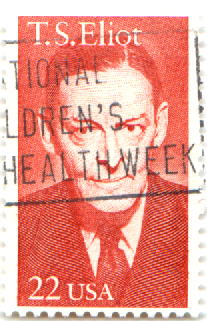FRtR > Outlines > American Literature > Modernism and Experimentation > Authors > T.S. Eliot (1888-1965)
An Outline of American Literature:
by Kathryn VanSpanckeren
Modernism and Experimentation: Authors: T.S. Eliot (1888-1965)
*** Index***
 Thomas Stearns Eliot was born in St. Louis, Missouri, to a well-
to-do family with roots in the northeastern United States. He
received the best education of any major American writer of his
generation at Harvard College, the Sorbonne, and Merton College
of Oxford University. He studied Sanskrit and Oriental
philosophy, which influenced his poetry. Like his friend Pound,
he went to England early and became a towering figure in the
literary world there. One of the most respected poets of his day,
his modernist, seemingly illogical or abstract iconoclastic
poetry had revolutionary impact. He also wrote influential essays
and dramas, and championed the importance of literary and social
traditions for the modern poet.
Thomas Stearns Eliot was born in St. Louis, Missouri, to a well-
to-do family with roots in the northeastern United States. He
received the best education of any major American writer of his
generation at Harvard College, the Sorbonne, and Merton College
of Oxford University. He studied Sanskrit and Oriental
philosophy, which influenced his poetry. Like his friend Pound,
he went to England early and became a towering figure in the
literary world there. One of the most respected poets of his day,
his modernist, seemingly illogical or abstract iconoclastic
poetry had revolutionary impact. He also wrote influential essays
and dramas, and championed the importance of literary and social
traditions for the modern poet.
As a critic, Eliot is best remembered for his formulation of the
"objective correlative," which he described, in The Sacred
Wood,
as a means of expressing emotion through "a set of objects, a
situation, a chain of events" that would be the "formula" of that
particular emotion. Poems such as "The Love Song of J. Alfred
Prufrock" (1915) embody this approach, when the ineffectual,
elderly Prufrock thinks to himself that he has "measured out his
life in coffee spoons," using coffee spoons to reflect a humdrum
existence and a wasted lifetime.
The famous beginning of Eliot's "Prufrock" invites the reader
into tawdry alleys that, like modern life, offer no answers to
the questions of life:
Let us go then, you and I,
When the evening is spread out against the sky
Like a patient etherized upon a table;
Let us go, through certain half-deserted streets,
The muttering retreats
Of restless nights in one-night cheap hotels
And sawdust restaurants with oyster-shells:
Streets that follow like a tedious argument
Of insidious intent
To lead you to an overwhelming question...
Oh, do not ask, "What is it?"
Let us go and make our visit.
Similar imagery pervades The Waste Land (1922), which
echoes
Dante's Inferno to evoke London's thronged streets around the
time of World War I:
Unreal City,
Under the brown fog of a winter dawn,
A crowd flowed over London Bridge, so many
I had not thought death had undone so many... (I, 60-63)
The Waste Land's vision is ultimately apocalyptic and
worldwide:
Cracks and reforms and bursts in the violet air
Falling towers
Jerusalem, Athens, Alexandria
Vienna London
Unreal (V, 373-377)
Eliot's other major poems include "Gerontion" (1920), which uses
an elderly man to symbolize the decrepitude of Western society;
"The Hollow Men" (1925), a moving dirge for the death of the
spirit of contemporary humanity; Ash-Wednesday (1930), in
which
he turns explicitly toward the Church of England for meaning in
human life; and Four Quartets (1943), a complex, highly
subjective, experimental meditation on transcendent subjects such
as time, the nature of self, and spiritual awareness. His poetry,
especially his daring, innovative early work, has influenced
generations.
*** Index***
 Thomas Stearns Eliot was born in St. Louis, Missouri, to a well-
to-do family with roots in the northeastern United States. He
received the best education of any major American writer of his
generation at Harvard College, the Sorbonne, and Merton College
of Oxford University. He studied Sanskrit and Oriental
philosophy, which influenced his poetry. Like his friend Pound,
he went to England early and became a towering figure in the
literary world there. One of the most respected poets of his day,
his modernist, seemingly illogical or abstract iconoclastic
poetry had revolutionary impact. He also wrote influential essays
and dramas, and championed the importance of literary and social
traditions for the modern poet.
Thomas Stearns Eliot was born in St. Louis, Missouri, to a well-
to-do family with roots in the northeastern United States. He
received the best education of any major American writer of his
generation at Harvard College, the Sorbonne, and Merton College
of Oxford University. He studied Sanskrit and Oriental
philosophy, which influenced his poetry. Like his friend Pound,
he went to England early and became a towering figure in the
literary world there. One of the most respected poets of his day,
his modernist, seemingly illogical or abstract iconoclastic
poetry had revolutionary impact. He also wrote influential essays
and dramas, and championed the importance of literary and social
traditions for the modern poet.